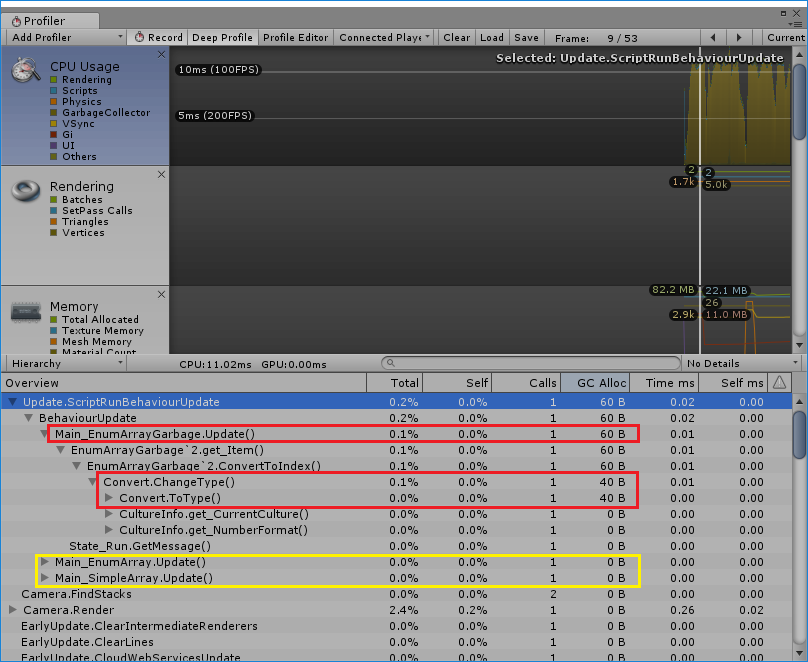시나리오: enum으로 상태 관리
간단한 예제를 생각해보자.
IState를 구현한 클래스가 있다고 가정하자.
그리고 클래스를 enum으로 관리하려고한다.
IState를 구현한 클래스가 몇개로 늘어날지 모르니 배열을 사용했다.
interface IState {
string GetMessage();
}
class State_Wait : IState {
public string GetMessage() {
return "wait";
}
}
class State_Run : IState {
public string GetMessage() {
return "run";
}
}
enum States {
Wait,
Run,
}using UnityEngine;
class Main_SimpleArray : MonoBehaviour {
IState[] states;
private void Start() {
states = new IState[2];
states[(int)States.Wait] = new State_Wait();
states[(int)States.Run] = new State_Run();
}
private void Update() {
var msg = states[(int)States.Run].GetMessage();
}
}배열에 접근하기 위해서는 enum을 int로 바꿔야한다.
매번 states[(int)States.Run]과 같이 (int)를 붙여서 캐스팅하는게 생각보다 귀찮더라.
그래서 새로운 클래스를 만들어서 배열을 추상화시켜봤다.
제네릭을 이용해서 여러종류의 enum에 대해서도 작동할수 있도록 구현했다.
class EnumArrayGarbage<TEnum, TValue> {
TValue[] data;
public EnumArrayGarbage(int count) {
data = new TValue[count];
}
public TValue this[TEnum key]
{
get { return data[ConvertToIndex(key)]; }
set { data[ConvertToIndex(key)] = value; }
}
int ConvertToIndex(TEnum key) {
var i = Convert.ChangeType(key, typeof(int));
return (int)i;
}
}class Main_EnumArrayGarbage : MonoBehaviour {
EnumArrayGarbage<States, IState> states;
void Start() {
states = new EnumArrayGarbage<States, IState>(2);
states[States.Wait] = new State_Wait();
states[States.Run] = new State_Run();
}
private void Update() {
var msg = states[States.Run].GetMessage();
}
}EnumArrayGarbage를 사용하면 캐스팅 없이 쓸 수 있으니까 좋다.
로 끝날거면 이런 글은 안쓴다. 유니티 프로파일러를 띄워보자.

Main_EnumArrayGarbage.Update()에서 60Byte씩 GC Alloc가 발생하고 있다.
Main_SimpleArray.Update()에서는 GC Alloc가 없었는데 고작 int 캐스팅 없애겠다고 고친 코드에서 GC가 발생하니 쓰고싶지 않더라. int 캐스팅도 없으면서 GC Alloc도 없었으면 좋겠다.
GC Alloc가 발생하는 지점을 따라가보면 문제를 찾을수 있다.
ConvertToInt()에서 사용한 Convert.ChangeType()에서 GC Alloc가 발생하고있다.
Convert.ChangeType()의 첫번째 인자의 타입이 Object라서 boxing때문에 GC Alloc가 발생한다.
C++ 같았으면 무식하게 캐스팅 붙여서 enum을 int로 바꿀수 있었을 것이다.
int ConvertToIndex<TEnum>(TEnum key) {
var i = (int)key;
return i;
}하지만 C#의 제네릭은 C++의 템플릿과 다르다. 그래서 C#에서의 위의 코드가 컴파일되지 않는다. 다른 방법을 써야한다.
인터넷을 뒤지면 이런 문제는 누군가 해결해놨으니 갖다쓰면 된다.
C# non-boxing conversion of generic enum to int?을 참고해서 EnumArray를 다시 구현했다. 이렇게하면 GC Alloc가 발생하지 않는다.
class EnumArray<TEnum, TValue> {
TValue[] data;
public EnumArray(int count) {
data = new TValue[count];
}
public TValue this[TEnum key]
{
get { return data[ConvertToIndex(key)]; }
set { data[ConvertToIndex(key)] = value; }
}
int ConvertToIndex(TEnum key) {
return CastTo<int>.From(key);
}
}
// https://stackoverflow.com/questions/1189144/c-sharp-non-boxing-conversion-of-generic-enum-to-int
/// <summary>
/// Class to cast to type <see cref="T"/>
/// </summary>
/// <typeparam name="T">Target type</typeparam>
public static class CastTo<T> {
/// <summary>
/// Casts <see cref="S"/> to <see cref="T"/>.
/// This does not cause boxing for value types.
/// Useful in generic methods.
/// </summary>
/// <typeparam name="S">Source type to cast from. Usually a generic type.</typeparam>
public static T From<S>(S s) {
return Cache<S>.caster(s);
}
private static class Cache<S> {
public static readonly Func<S, T> caster = Get();
private static Func<S, T> Get() {
var p = Expression.Parameter(typeof(S), "s");
var c = Expression.ConvertChecked(p, typeof(T));
return Expression.Lambda<Func<S, T>>(c, p).Compile();
}
}
}class Main_EnumArray : MonoBehaviour {
EnumArray<States, IState> states;
void Start() {
states = new EnumArray<States, IState>(2);
states[States.Wait] = new State_Wait();
states[States.Run] = new State_Run();
}
private void Update() {
var msg = states[States.Run].GetMessage();
}
}IL2CPP
유니티에서 모바일 개발을 하면 IL2CPP는 피할수 없다. iOS 11 부터는 64비트 어플리케이션만 굴러간다. 그리고 유니티에서 64비트 지원을 할수 있는 방법은 아직까지는 IL2CPP뿐이다.
IL2CPP 옵션을 켜고 빌드한후 실행하면 에러가 난다.
NotSupportedException: C:\Program Files\Unity-2017.1.0f3\Editor\Data\il2cpp\libil2cpp\icalls\mscorlib\System.Reflection.Emit\DynamicMethod.cpp(19) : Unsupported internal call for IL2CPP:DynamicMethod::create_dynamic_method - System.Reflection.Emit is not supported.: so.libsora.enumarray
at System.Reflection.Emit.DynamicMethod.CreateDynMethod () [0x00000] in <filename unknown>:0 : so.libsora.enumarray
at System.Reflection.Emit.DynamicMethod.CreateDelegate (System.Type delegateType, System.Object target) [0x00000] in <filename unknown>:0 : so.libsora.enumarray
at System.Linq.Expressions.Expression`1[TDelegate].Compile () [0x00000] in <filename unknown>:0 : so.libsora.enumarray
at CastTo`1+Cache`1[T,S]..cctor () [0x00000] in <filename unknown>:0 : so.libsora.enumarray
at CastTo`1[T].From[S] (.S s) [0x00000] in <filename unknown>:0 : so.libsora.enumarray
at EnumArray`2[TEnum,TValue].set_Item (.TEnum key, .TValue value) [0x00000] in <filename unknown>:0 : so.libsora.enumarray
at Main_EnumArray.Start () [0x00000] in <filename unknown>:0 : so.libsora.enumarray
Rethrow as TypeInitializationException: The type initializer for 'CastTo.Cache<System.Int32,States>' threw an excep: so.libsora.enumarrayCastTo<T>를 구현하는 과정에서 create dynamic method가 사용되었다.
말 그대로 런타임에 함수를 생성하는 것이다.
하지만 iOS에서는 런타임에 함수 생성하는게 금지되어 있다.
그래서 IL2CPP에서도 관련 기능은 구현한거같지 않더라.
즉, IL2CPP를 쓰면 답이 없다. 캐스팅 노가다를 하자.
Updated: 더 좋은 방법
나는 iOS 개발을 주력으로 하지 않아서 여기까지 만지고 삽질을 관뒀다. 나중에 iOS까지 대응하는 더 좋은 방법이 있다고 들어서 링크를 남겨둔다.